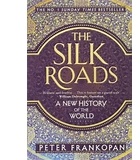A New York Winter’s Tale by Mark Helprin, Picador, 748pp
A magical realist fable set in an imaginary New York. In what seems to be the nineteenth century, Peter Lake, an orphan brought up by the primitive Baymen and now a burglar, burgles a grand mansion which he believes to be empty. However he encounters Beverly, the consumptive daughter of newspaper magnate Isaac Penn, and the two fall in love. Peter Lake is pursued by the Short Tails gang, led by Pearly Gates, who has vowed to kill him.
The book is rife with strange symbols. In the opening scene, a white horse escapes and gallops through the frozen streets of New York. A white cloud threatens to engulf parts of the city. Some scenes take place at the Lake of the Coheeries, an entirely mythical upstate lake. A generation or two later, the city is threatened and Peter Lake reappears. Wonderful stuff. You should read it.
 The Silk Roads – a new history of the world, by Peter Frankopan. 636pp
The Silk Roads – a new history of the world, by Peter Frankopan. 636pp